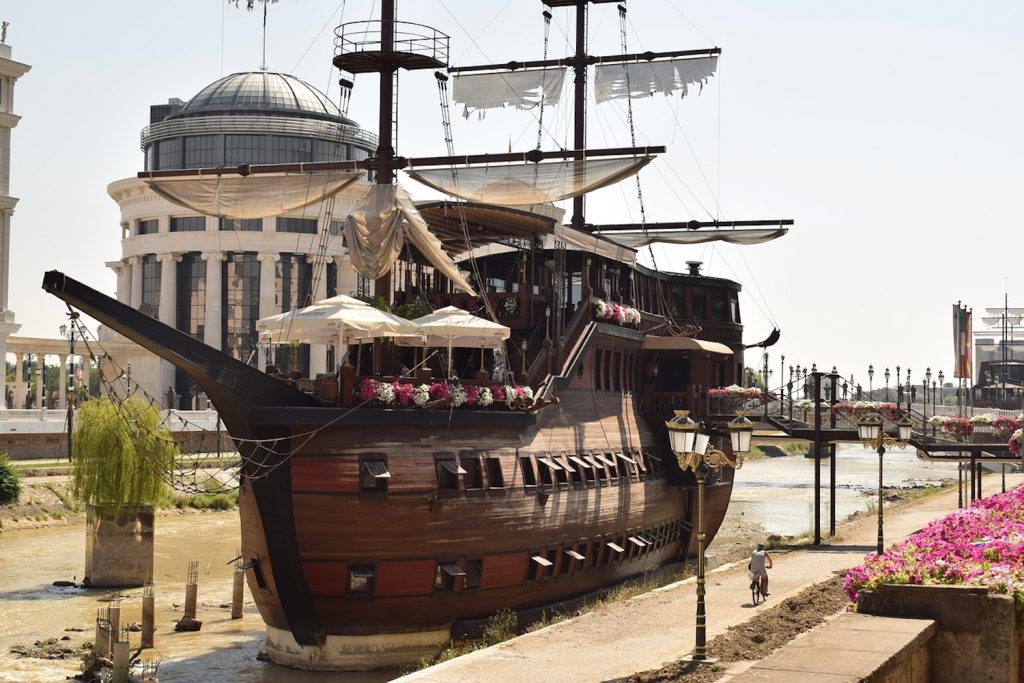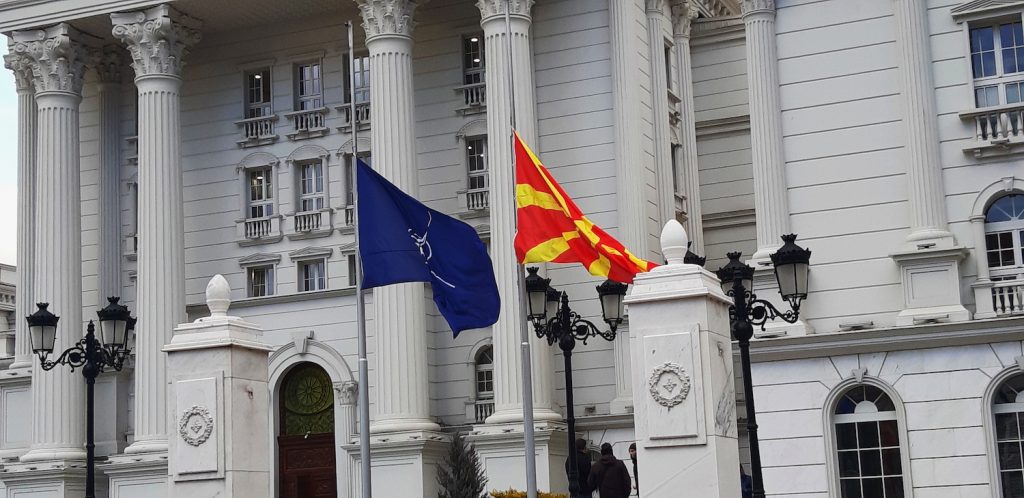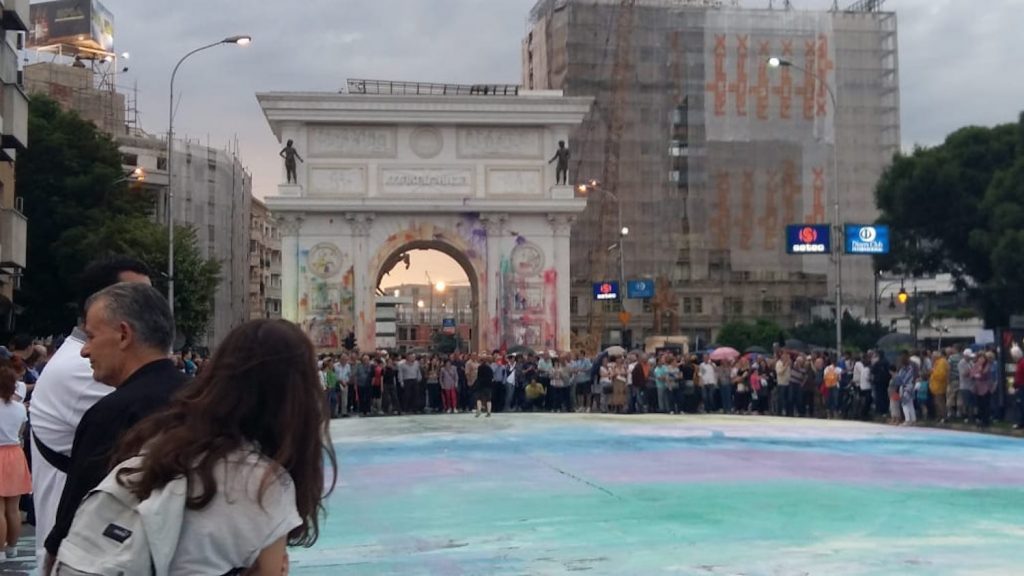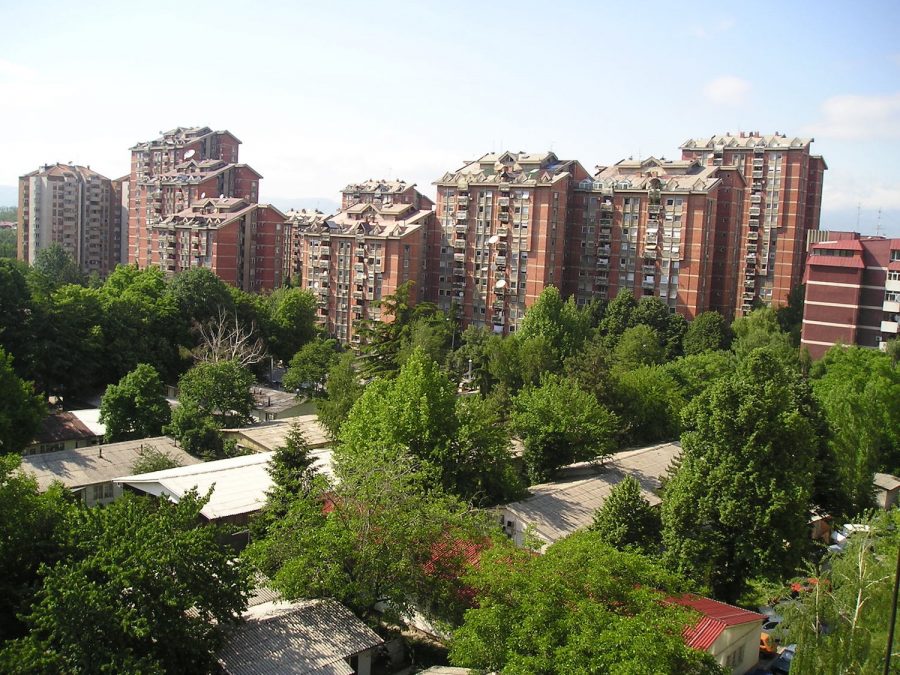Some people are attached to their hometown because some cities are able to elicit feelings of loyalty, belonging and nostalgia. These cities are like a flawed but ultimately charming protagonist with a past that is both happy and sad. So the residents of these places who play supporting roles in the collective city narrative end up having complicated relationships with their imperfect homes. I am one of those people with one of those towns.
Skopje is a city where, in the summer, you stay out by the river or in the park at odd hours after bars close. It is a city that had a 3-month Colorful Revolution in 2016 that helped remove VMRO’s right-wing 11-year authoritarian regime by throwing paint-balloons at the nationalist monuments VMRO erected. It is a city of thousands of people meeting for coffee and cigarettes every day like it’s the Jim Jarmusch film. It is a city with good pizza, with cozy cafes perfect for friendship confessionals, with a fantastic Pride Weekend every June. But it is above all else a city that is incredibly felt through language and self-deprecating jokes about Slavicness that writing about it in English feels off.
Before moving to Berlin in 2015, Skopje was all I knew. The majority of my memories were made in a city that was big enough that you could constantly meet new people but small enough that having a community was possible. Skopje is the city of most of my firsts: first days of school, first kisses, first protests, first hangovers, first feelings of belonging.
It was also the first city that I left.
You can’t not love Skopje, proud Skopjani will say. I feel the same.
Skopjani talk about Skopje with the passion that New Yorkers talk about New York. Unlike New York, though, Skopje isn’t imprinted in public consciousness through film and television. Skopjani take it upon themselves to commemorate their city. They’ve told its story for generations. The story of Skopje is so important to the the lives of many of its residents, past and present, that criticizing their beloved city is taken as a personal attack.
So maybe telling us that we’re the most polluted capital in Europe can come off as a little insensitive. Or pointing out that VMRO laundered more than 600 million euros through the Skopje 2014 architectural project, or the new facades of public buildings that feel hollow when you knock on their walls and restaurants in the shape of boats on the Vardar river. Or that before our new NATO membership, the US army displayed tanks in the city center where children took pictures with guns like it was a normal thing. God, it’s so far from being a perfect city — and yet, despite all of that, Skopje still manages to sweep newcomers and life-time Skopjani off their feet. My boyfriend fell in love with Skopje at first sight even though he had heard plenty about its flaws.

You can’t not love Skopje.
Or can you?
I don’t think that I will ever stop loving this city, but sometimes I feel like I am too close to it to see its flaws clearly. Even though I don’t live there anymore, it seems like I haven’t gotten enough distance. Or maybe it’s the distance that’s the problem? Time away from MKC and Kapistec and Gradski Park induces feelings of nostalgia that I let myself indulge in. When I struggle to put the verb at the end of a German sentence, I often find refuge in pretty images of a city I left. Skopje: so beautiful, so unique, so charming, so fun, so homey. But also so corrupt and kitschy and segregated and so, so polluted, and now the capital of a state with a newly gained membership in NATO — a military alliance that not too long ago bombed Belgrade.
Sometimes I let myself forget that this isn’t a city full of just good memories. It is a place where my female middle school teachers tolerated the boys who sexually harassed me and many other girls even as we spoke up. It is a city where Roma children still beg on the street. It is the capital of a country that was so engulfed in nationalism and poverty for 11 years that it let Nikola Gruevski’s right-wing VMRO-DPMNE launder money through the construction of the Skopje 2014 project that gave rise to Baroque statues of national “heroes” and imperialists like Alexander the Great that only made Skopje look ugly. It is a place where, in a church, a family friend put his hand on my butt and I wasn’t sure how to address it without making a scene, so I said nothing. It is the city where the police killed a 22-year-old boy and in which citizens heard a wiretapped conversation of our ex-Minister of Interior saying she got angry because VMRO was losing a lot as a party because a murder happened at one of their rallies. It is the place where the doctor whose son I went to prom with sexually harassed me in front of my dad while my shirt was off after he had taken out two tumors from my left breast. It is the city that the Social Democrats now are failing to save.
Over the past few years Skopjani have watched their city gain a title they never expected: the most polluted capital in Europe. My dad recalls Skopje also being polluted twenty years ago, but in the past five years or so it has become a bigger topic of concern, with school days sometimes being cancelled in January due to excessive pollution. “How polluted do you think it is today?” makes for a good ice-breaker in the morning. In winter, Skopje’s pollution levels reach up to 4.5 times higher than the recommended average, so, when drinking our coffee, my dad and I tend to make bets on how bad it is that day before checking the MyAir app. Sometimes the state-run measuring stations “mysteriously” don’t have any data available.

The Skopje air may elicit two reactions from a smoker: 1) feel like it’s too polluted outside to voluntarily inhale extra smoke, or 2) smoke regardless of the pollution because everyone is getting lung damage anyway.
But what’s the reason for such a catastrophe?
Well, nature is partly to blame. Skopje is located in a valley surrounded by mountains on all sides, so it is hard for the polluted air to be blown away from the city. Some politicians have blamed old cars and poor households that use wood and coal for heating. The current opposition — VMRO — blame the current government – the Social Democrats — and when the current government used to be the opposition, they too blamed the then government — VMRO. A joint European report points to industry as the biggest polluter. Then there is also the medical waste incinerator that the UK gave to Macedonia in 2001 that would be illegal under UK laws and that has since been burning hundreds of tons over capacity.
Whatever the exact cause, Skopje has a pollution problem. A big one. And what does the Social Democratic government of the newly renamed Republic of North Macedonia plan to do about this massive environmental and health crisis? Allocate 1.5 million euros of the 2018 state budget to help solve it while allocating 8.3 billion euros to the Ministry of Defense. As a now NATO member state, 1,19% of our GDP will go to military spending to send troops to countries like Afghanistan, while Skopje (and nearby Tetovo and Bitola) suffocate.
Is this what we were fighting for three years ago? Did we throw all those paint balloons just to end up with a little more media freedom and a lot more militarization?

The 2016 Colorful Revolution was inspiring and so formative of my politics and worldview. For those few months, it felt like we – activists, students, parents, workers, artists, unemployed citizens, Macedonians, Albanians, queers, leftists – were coming together to do something really radical, to get rid of an autocratic regime — and we did just that. It was the main goal, but I thought that we were fighting for more than that. But maybe it wasn’t as radical as I thought it was; maybe the paint we threw at the Baroque embodiments of Gruevski’s rule were just a momentary expression of anger rather than a structural critique. Still, I know that I and many others were sincere in our desire to really change things and to make Macedonia truly more democratic.
Was all of that just to get a seat at the NATO table where voting isn’t even a part of the decision-making procedure? Did we rise up and protest in 2015 and 2016 against Gruevski’s undemocratic, corrupt, economically-crippling regime only to wake up to smog-filled cities? Did we take down a government whose president pardoned his politician friends only to have a Social Democratic coalition bar freelancers and retirees with low pensions from selling fruits and vegetables on markets to make ends meet? Did we take away power from embezzlers just to appease the interests of NATO, a military organization that seems like a remnant of a Cold War that ought to have been over by now? Did we do all of that to be just another polluted city in another impoverished country?
But you can’t not love Skopje.
Right?
“No justice, no peace,” we chanted during our short-lived revolt. I meant that chant every time I said it along with thousands of other angry fellow citizens. We wanted justice and economic change and democracy. We still want those things, but I don’t know if I have the answers as to how to get them.
Skopje, I still love you to death even though a lot about you has been kind of disappointing over the years. Still, I believe there is something to your charm that extends beyond just fond memories and comforting bars. A part of me still feels hopeful. We rose once, and maybe we can do it again. Maybe the fantasy that I have of you will one day become a reality. Sorry I might not be there to help you along the way. If I don’t move back, perhaps my side-character role in your grand story will be of a diaspora member who will always genuinely love you and write about you with the hope of helping you become more inclusive, less polluted, more democratic and maybe even less militarized from afar.


What did your father do while your doctor, the father of your prom date, sexually harassed you? Did it happen before or after the intervention? I apologize, but I find that sentence quite confusing.
An acquaintance told me about this city, it should be very beautiful! A certain day I would see it! ))